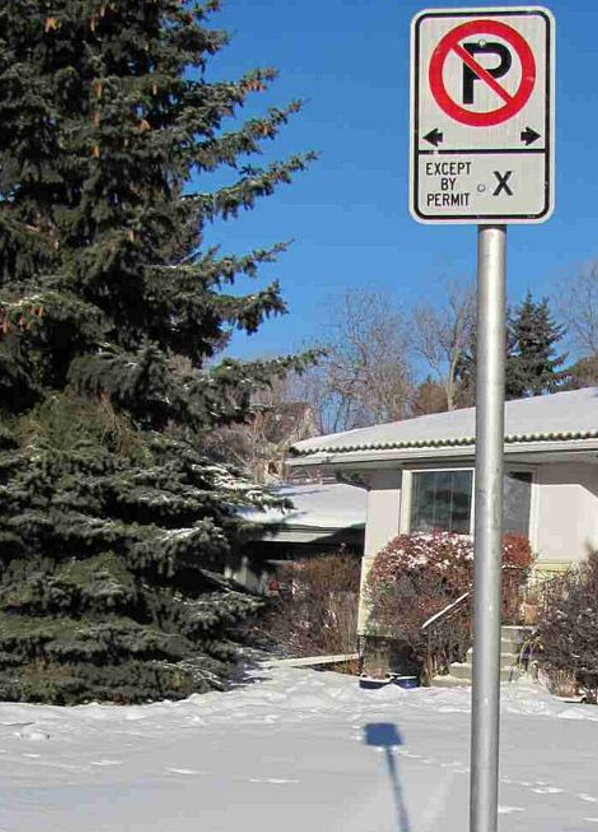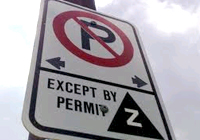Residential Parking Permit (RPP) Program
For general inquiries regarding the RPP Program, please contact the Calgary Parking contact centre at 403-537-7000 or email RPP@calgary.ca.
About the Residential Parking Permit (RPP) Program
The Residential Parking Permit (RPP) Program is a service Calgarians can request in busy residential areas where parking is in high demand due to parking generators such as a hospital, post-secondary facility or LRT station.
On-street space is public property. Without the RPP Program, parking on-street would be available to anyone and residents would not have unique parking privileges.
Residential parking restrictions are implemented by resident request once 80 per cent of a block supports the restriction. Once parking restrictions are established, residents can apply for parking permits.
Background
In the past, some residents received two residential permits and two visitor permits for free. However, to ensure the program is financially sustainable, user fees for all users were introduced. These fees help cover the cost of administering the program and align with the User Fees and Subsidies Policy, which requires programs to recover costs rather than rely on general tax funds.
There were two phases of public engagement to gather feedback about the program with the intent to improve the parking experience for all Calgarians. This input was used to develop the recommended changes to the program that were presented and approved by Council in 2021.
Information about the updated policy can be found in Calgary Parking Policies. Corresponding bylaw changes can be found in the Calgary Traffic Bylaw 26M96, sections 20 to 26.
As a result, the program moved to a full cost-recovery model with the introduction of user fees that remain comparable to other residential parking permit programs in the country and brings it into alignment with the User Fees and Subsidies Policy.
Managing the costs of parking permits encourages residents to consider off-street parking options as well as other transportation options, while balancing the need for providing convenient parking options for people who need to drive.
Is my address eligible for a parking permit?
What parking permit is my address eligible for?
When is a residential parking permit required?
You need a permit if you live in a Residential Parking Zone and want to park on a street that has parking restrictions (“Except by Permit” or “2-hour Time Limit Except by Permit”).
Why is there a user fee for parking permits?
The program is in place to manage on-street parking, not to generate revenue. Charging a user fee for parking permits will help recover the cost of administering the program.
Without user fees, the program is funded by general parking revenue (lots, parkades and ParkPlus zones) that would otherwise be used for broader community investments like events, enhanced public spaces and neighbourhood improvements. Examples include: 5A Network, Stephen Avenue Masterplan and other community improvement projects.
Requiring fees for this service is in line with most Canadian municipalities and brings the program into alignment with the User Fees and Subsidies Policy.
What are the current Council-approved user fees for each building type?
When did the Council-approved parking permit fees become effective?
The Council-approved parking permit user fees became effective on December 4, 2023.
Council also approved new user fees for the Market and Low-Income Market Permit that became effective January 1, 2024.
Why can't RPP ticket revenue fund the program?
As per the Calgary Parking Policies, 100 per cent of net revenue from parking enforcement activities goes directly to the City’s general revenue and does not fund any specific program.
Why did the program change?
To balance the changing parking needs of residents, visitors, businesses, and neighbourhoods, The City of Calgary updated the Residential Parking Policy in January 2021, following two years of public engagement. As part of the policy changes, updates were required for the program to be aligned. The revised program aims to increase street use efficiency and fairness, support businesses, and be better positioned for long-term sustainability.
What are the benefits of the program?
The program limits on-street public parking on a particular block so residents who utilize the service can have better access to on-street parking near their homes. Residential parking restrictions are implemented by resident request once 80 per cent of a block supports the restriction. Once parking restrictions are established, residents can apply for parking permits.
This program benefits those who utilize the service, not all Calgarians.
Parking impacts how all citizens live, work and play in our city, and is an important part of the overall transportation system. A well-designed parking system that manages available street space effectively will improve traffic flow and enhance street conditions whether you walk, wheel, drive, or take transit.
About Residential Parking Zones (RPZ)
Residential Parking Zones (RPZs) are areas of the city with high parking congestion that employ certain parking exemptions for eligible residents of the zone. For example, many zones use two-hour time restrictions to manage short-stay parking, but permit holders are exempt from the time restriction.
RPZs are established by The City using data. They may be created when there is demonstrated, ongoing parking congestion in a residential neighbourhood that is the result of a major parking generator.
The rules governing the application and use of Residential Parking Zones are contained in the Calgary Traffic Bylaw 26M96, sections 20 to 26. The City maintains an up-to-date record and map of the residential parking zones on its website.

Am I eligible for a parking permit?
In Residential Parking Zones (RPZs), The City offers parking permits to residents who qualify.
Permits may be issued to a resident on a block with parking restrictions within a residential parking zone under one of the following classes:
| BUILDING TYPE | DEFINITION | PERMIT ELIGIBILITY |
|---|---|---|
| Large Multi-Residential Building | Four stories or more in height or with more than 20 dwelling units | One Market Permit |
| Pre-1945 Large Multi-Residential Building | Four stories or more in height or with more than 20 dwelling units and built before 1945 | One Select Permit Available December 4, 2023 |
| Small Multi-Residential Building | Less than four stories in height and has 20 or fewer dwelling units | One Select Permit Available December 4, 2023 |
| Ground-Oriented Building | Detached, semi-detached and duplex houses, fourplexes, townhouses, rowhouses and some low profile multi-residential buildings | Maximum three Residential Parking Permits & two Visitor Permits |
How can I request a new parking restriction sign?
Requests can be made by the public by calling 311 or filling out a 311 online request using the drop-down prompts below under the Provide Details section:
- For ‘nature of your concern’ select ‘residential parking’
- For ‘specify your residential parking inquiry’, select ‘add/modify parking sign’
Residential parking restriction signs can only be installed in existing residential parking zones, and only one parking restriction is permitted per block.
New restrictions require a parking study. Parking studies are conducted to determine on-street occupancy in residential areas to address parking issues. The minimum study area is one block and will include both sides of the street. Study periods will be based on peak times of the nearby parking generator.
If the parking study shows occupancy is 80% or higher, two-hour parking except by permit signs can be added.
A petition is issued to residents of the affected block. This is so they can gather neighbourhood support for the implementation of the recommended two-hour parking except by permit signs.
If the petition is signed by 80% or more of the people who live in the area, signs will be installed, and residents are eligible to apply for permits from the Calgary Parking.
Please note: Requests for changes to existing residential parking signage or new residential parking signage will be considered based on location.

How can I modify a parking restriction sign?
Requests can be made by the public by calling 311 or filling out a 311 online request using the drop-down prompts below under the Provide Details section:
- For ‘nature of your concern’ select ‘residential parking’
- For ‘specify your residential parking inquiry’, select ‘add/modify parking sign’
Modifications to existing restrictions requires a parking study. Parking studies are conducted to determine the on-street occupancy. Removing restrictions without sufficient evaluation may result in an influx of on-street parking and prompt residents to request adding parking restrictions again.
The minimum study area is one block and will include both sides of the street. Study periods will be based on peak times of the nearby parking generator.
Where occupancy is between 50% and 80%, the existing signage is considered appropriate and remains unchanged. The requestor will be notified.
Where occupancy is less than 50%, signage can be changed to a lower restriction. Residents of the affected block will be notified by The City of Calgary advising of the lower restriction and the timeline of removal.
Signage restriction levels are:
- No Restrictions (least restrictive)
- Two-hour parking except by permit
- No Parking except by permit (most restrictive)

